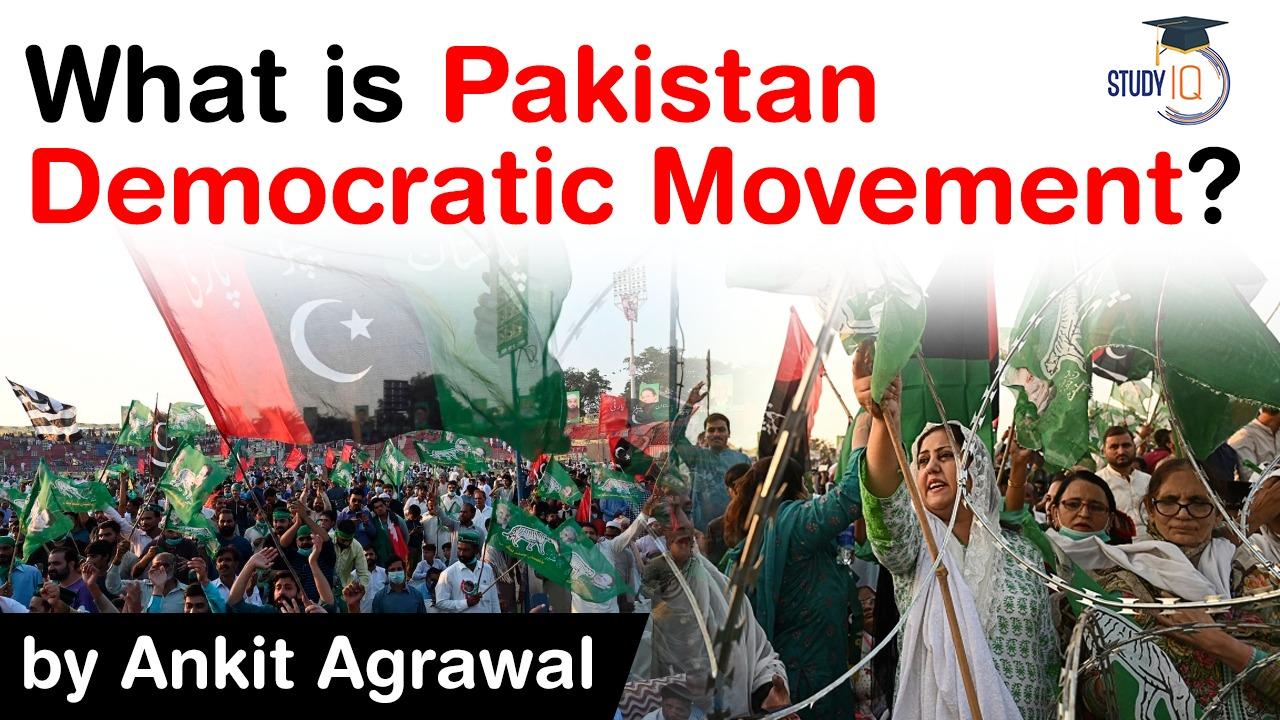Table of Contents
- International Relations
- India and its neighborhood – International relations
- Bilateral, regional and global groupings and agreements involving India and/or affecting the Indian interests
- Effect of policies and politics of developed and developing countries on India’s interests, Indian diaspora.
Introduction
- Pakistan has been there
- Political parties coming together in alliance to take on a military dictator or an authoritarian civilian government.
- But this time, it is in the form and shape of the Pakistan Democratic Movement (PDM).
When & how the PDM was formed?
- The Pakistan Democratic Movement (PDM) was formed in September by the leader of the Jamiat Ulema-e-Islam, Fazal-ur-Rehman,
- But constituted by 11 political parties, representing virtually the country’s entire political spectrum.
- It has brought together the two mainstream but rival political parties,
- The Pakistan People’s Party (PPP) led by Bilawal Bhutto and the Pakistan Muslim League (PML) led by the exiled Nawaz Sharif, but currently headed by his daughter Maryam.
- More significantly, the PDM has also given a national platform to regional parties and provincial leaders from Balochistan and Khyber Pakhtunkhwa,
- Who have been targeted by the Pakistani military for demanding regional autonomy and an end to repression.
Its importance
- This is the first time that the Punjabi heartland was listening to voices from the periphery and connecting with its hitherto marginalised people.
- This is an important development in itself.
- The PDM has so far held three massive political rallies, in Pakistani Panjab’s Gujranwala on October 18, in Karachi two days later, and in Quetta on October 25.
The real target of PDM
- Pakistan has politically isolated Prime Minister Imran Khan and, therefore, undermined the credibility of his powerful military backers.
- That he has managed to inspire such disparate parties to come together on the same platform to oppose him, speaks to his incompetence.
- But in demanding his ouster, the PDM’s real target is the powerful military.
- In his speech broadcast from London, Nawaz Sharif explicitly accused the Army Chief Qamar Javed Bajwa and the ISI chief Faiz Hameed as responsible for rigging the last elections and installing Imran Khan as prime minister.
- This is a frontal attack on the army and if allowed to snowball, it has the potential of eroding its overpowering influence in the country’s politics.
- In the past, the army has been able to manipulate political parties and leaders, playing off one against the other.
- If the coalition holds together, this tried-and-tested playbook may not work.
Weakness of PDM
- While the PDM has come together to oust Imran Khan, it does not seem to have a game plan for the day after.
- How do they propose to bring the military to heel?
- At what point would the movement consider its mission accomplished and revert to competitive politics, which is the essence of parliamentary democracy?
- How do the PDM leaders propose to tackle the acute economic crisis that Pakistan is facing, compounded by the pandemic?
For India?
- As a liberal democracy, India would normally welcome the emergence of the PDM and its struggle to establish a truly civilian democracy in Pakistan.
- A diminished political salience of the Pakistani military could only be a positive development from India’s point of view.
Q) Which of the following statements regarding Partition of India is correct?
- Direct action Day was launched in 1946 by Congress.
- During partition, violence broke out in Bengal and Punjab but not in United Provinces.
- Congress approved of the partition plan to stop the civil war in the country.
- 1 & 2 only
- 2 & 3 only
- 3 only
- All of the above
Latest Burning Issues | Free PDF

























 WhatsApp
WhatsApp